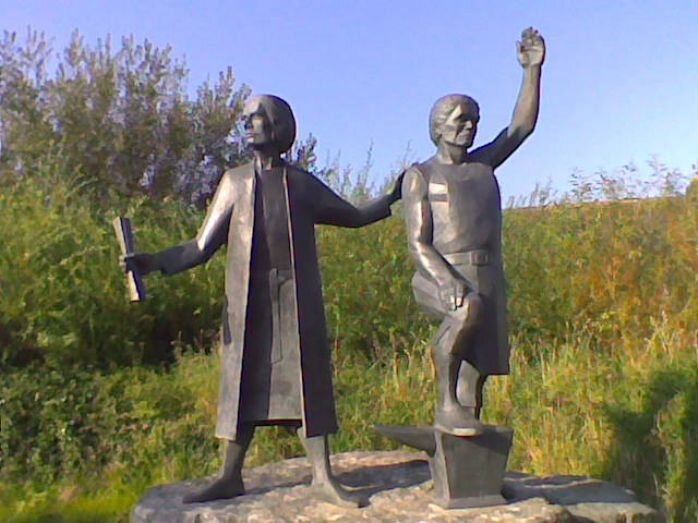The Last Rebellion of the Wars of the Roses Commemorative statue in St Keverne, Cornwall. In Cornwall, 27th June is remembered for an event in 1497 which could be described as the last battle of the Wars of the Roses. After the defeat of Richard III and the disappearance of Edward’s heirs, there was some disquiet when pretenders to the throne appeared. The first, Lambert Simnel, claimed to be the son of George, Duke of Clarence. His invasion and insurrection was defeated at the Battle of Stoke Field on 16 June 1487 The second, Perkin Warbeck, arrived in Britain in 1495, sponsored by Margaret, Duchess of Burgundy. His claim was that he was Richard, youngest son of King Edward; one of the ‘Princes in the Tower’. After a spell in Ireland he found strong support from James IV of Scotland, who took up arms on his behalf. King Henry VII reacted to this by raising an army to fight the Scots. Already with a reputation for high taxes, Henry set about raising additional taxes to fight the Scots. Cornwall, already suffering through Henry’s attack on their Stannary rights, was unhappy about funding a war so far away in which they had little interest. John Morton, Henry’s chancellor, was seen as the cause of their problems and was the target of their ire. In 1497, a protest started in St Keverne, on the Lizard peninsula. It was led by Michael Joseph, known as An Gof, the blacksmith. He led a group determined to go to London to reason with the king. He was joined by Thomas Flamank, a lawyer from a prominent Bodmin family, and together they led an ever-growing protest out of Cornwall. By the time they reached Somerset, there were more than 15,000 marchers. It wasn’t an army. Longbows and agricultural tools were all they were armed with. There were parallels with the 1381 Peasant’s revolt; working men who thought taht they could reason with the King. Reaching Wells, in Somerset, they made the tactical mistake of welcoming James Touchet, Lord Audley, into their ranks, and putting themselves under his command. Touchet was from a Yorkist family and had personal grievances against King Henry besides the imposition of the tax to fight the Scots. His involvement, though, raised the march from being a protest against taxation to a protest against Tudor rule, and support for Perkin Warbeck. What could now be described as a rebel army marched on towards London, detouring to Kent, where they found that the previously rebellious men of Kent supported the King, and threatened the rebels. They continued to Blackheath, scene of the Bastard of Fauconberg’s stand in 1471. On 17th June, they were confronted by the King’s army; hugely superior in numbers and professionalism. After putting up a short but stout defence, the rebels were, unsurprisingly, routed. The leadership were all captured and put on trial. On 27th June, An Gof and Thomas Flamank were hanged at Tyburn. Flamank was quartered and his quarters displayed at the four gates to the city of London. A plan to quarter An Gof and send the parts to Cornwall was apparently abandoned for fear of causing more discontent there. On the following day, Lord Audley, a Peer, was beheaded. All three heads were displayed on London Bridge. Perkin Warbeck brought further grief to Cornwall in September 1497 by landing in Whitesand Bay with a small force. He found support among the outraged Cornish and was declared King Richard IV on Bodmin Moor. His supporters marched to Exeter and then Taunton where, confronted by a Royal army, they dispersed. Warbeck was captured, and on 23 November 1499 was dragged to Tyburn and hanged. The Wars of the Roses were over. This event is remembered in Cornwall on 27th June. In St Keverne there is a commemorative plaque in the churchyard wall and a statue of Michael Joseph, an gof, and Thomas Flamank on the edge of the village. There is also a plaque at Blackheath. |
The First Sunday of Lent 2026
-
Here is a very interesting recording of the Tract for the First Sunday of
Lent by the French ensemble Dialogos, with only female voices. The verses
Scapuli...
23 hours ago


No comments:
Post a Comment